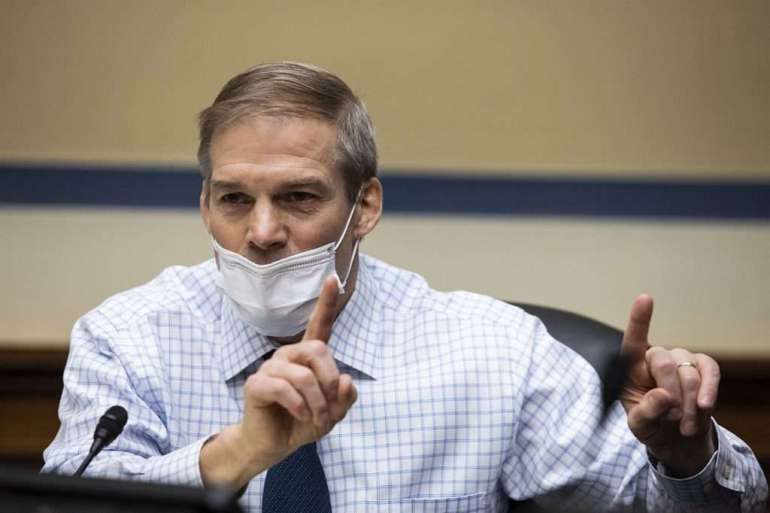House GOP opens fraught internal debate over earmarks

“I am totally against it,” added Rep. Jim Jordan (R-Ohio), a co-founder of the group. “I don’t think Republicans should be supportive of earmarks.”
The Republican Study Committee, the largest conservative caucus on Capitol Hill, will meet next week to discuss the issue. But the group started circulating a memo, obtained by POLITICO, warning that “capitulating to calls for reinstating earmarks will amplify the power” of Democratic leaders and could “create a more hierarchical Congress.”
“I understand the arguments, but I’ve lived through the abuses of past earmarks,” said veteran Rep. Kevin Brady (R-Texas), the top Republican on the House Ways and Means Committee. “I’m not a fan of restoring them. Right now, I’m very skeptical.”
But Republicans — who first banned earmarks when they took over the House majority following the 2010 Tea Party wave — haven’t been totally aligned on the issue, with some warming to the idea in recent years. While the practice is still formally prohibited under current House GOP conference rules, some Republicans have argued that allowing lawmakers to ensure money for specific projects restores power to the legislative branch and could help make the institution more functional.
“Earmarks never really went away. They just moved from Congress to the administration, I think, with less scrutiny and transparency,” said Rep. Garret Graves (R-La.).
Rep. Chuck Fleischmann (R-Tenn.), an appropriator, said the future of earmarks would ultimately be a conferencewide decision. But one of the biggest potential selling points, he said, is that bringing back earmarks would take authority away from the Biden administration. And he also noted that Democrats want to make the process more transparent.
“If I had to bet, Democrats will move forward with or without us,” Fleischmann said. “The question is, will we be able to avail ourselves of them?”
House Minority Leader Kevin McCarthy declined to say Wednesday whether he would support reinstating earmarks, saying he hasn’t seen Democratic leaders’ proposal yet. But he also didn’t rule it out, and internal discussions in the House GOP conference are expected to take place in the weeks ahead.
House Majority Leader Steny Hoyer, a longtime champion of earmarks, has discussed the topic several times with McCarthy. Democrats have not yet released their plan, but Hoyer has indicated the process would be reformed and earmarks would be used to help public and nonprofit projects.
“I’ve talked to a lot of Republicans who I expect are going to be requesting earmarks for their districts,” Hoyer told reporters Wednesday.
Across the Capitol, Senate Minority Leader Mitch McConnell said he would defer to Alabama Sen. Richard Shelby, the top Republican on the Senate Appropriations Committee, on the issue. Senate Republicans have been generally more receptive to earmarks but have followed the lead of their House counterparts in the past.
“I’m not against earmarks,” Shelby said, “I’m against bad, frivolous earmarks.”
Yet the internal dynamics are tricky, especially for McCarthy. If the California Republican throws his weight behind earmarks, it could infuriate the right — a crucial constituency for McCarthy to have in his corner.
But if McCarthy discourages Republicans from requesting money for proposals that benefit their districts, it could put his own members at a huge disadvantage while letting Democrats reap the rewards from the spending practice.
Earmarks can help members direct critical resources to their districts, giving them an easy way to earn points with constituents back home. The practice can also be a useful tool for congressional leaders who are trying to corral votes for certain spending bills. And with President Joe Biden pushing for a massive infrastructure package this Congress, there may be even more temptation for the GOP to get on board.
But some Republicans are still haunted by the infamous “bridge to nowhere” — a massive proposal to build a bridge between Ketchikan, Alaska, and a nearby island with an airport — that inspired the initial earmark ban. That’s not to mention the earmark scandals that helped end the careers of lawmakers in both parties during the early 2000s.
And some Republicans are keeping their powder dry — and waiting to hear more information — before they make a decision about using the spending practice, which is still controversial on the right.
“I’m old enough to remember when there was a Bridge to Nowhere,” said freshman Rep. Nancy Mace (R-S.C.), who represents a key swing district and serves on the House Transportation and Infrastructure Committee. “If there’s a way that they’re done in a constitutional manner, then I think that’s up for debate. But I don’t know enough about how they are being brought back.”
Heather Caygle, Marianne LeVine and Olivia Beavers contributed to this report.